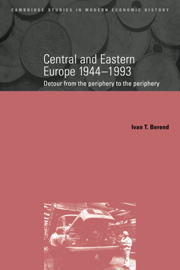Book contents
- Frontmatter
- Contents
- Preface
- Acknowledgments
- I Out from Europe: the introduction of state socialism, the Stalinist decades, and revolts against them
- II Temporary success and terminal failure: the post-Stalinist decades – modernization, erosion, and collapse
- III Back to Europe? Post-1989 transformation and pathways to the future
- 8 Building a parliamentary market system
- 9 Economic decline – political challenge – rising nationalism
- References
- Names index
- Subject index
9 - Economic decline – political challenge – rising nationalism
Published online by Cambridge University Press: 28 October 2009
- Frontmatter
- Contents
- Preface
- Acknowledgments
- I Out from Europe: the introduction of state socialism, the Stalinist decades, and revolts against them
- II Temporary success and terminal failure: the post-Stalinist decades – modernization, erosion, and collapse
- III Back to Europe? Post-1989 transformation and pathways to the future
- 8 Building a parliamentary market system
- 9 Economic decline – political challenge – rising nationalism
- References
- Names index
- Subject index
Summary
“Annus Mirabilis” followed by “Anni Miserabiles”: transition and severe economic decline
Closing down obsolete, uncompetitive sectors, ending subsidies or dismissing a part of the work force were important steps of the transformation. A negative side effect of this, however, is the resulting decline in production and increase in unemployment. Adjusting to world market prices and liberalizing imports creates competition for the heretofore protected and isolated Central and Eastern European economies, and this was also a prerequisite for market adjustment. On the other hand, it has caused a decline in output. In an age of major technological change and structural crisis, adjustment inevitably generates what Josef Schumpeter described as ‘creative destruction.’
Lacking or losing popular support, state socialist regimes sought to avoid destruction by resisting substantial reform. But by defending the existing structures they also destroyed the prerequisites of a creative adjustment.
The impact of the lack of adjustment became stronger after 1989, since new governments, which were seeking to adjust to the world market, were opening their economies and were unable to create market protection.
New and unfavorable external economic factors have contributed to the difficulties. The collapse of the Soviet Union and the former Comecon market, a mini Gulf-oil-crisis in early 1991, and a severe recession in the Western world in 1991–3 had negative repercussions and created additional barriers on the road to Central and Eastern European transformation.
Hence the exaggerated expectations and overoptimistic forecasts inevitably collided with harsh realities. The deterioration of the economy was much deeper and lasted much longer than originally anticipated. The former Solidarity advisor Tadeusz Kowalik presented a dramatic picture on the Polish situation: ‘Over the first year alone (1990) …
- Type
- Chapter
- Information
- Central and Eastern Europe, 1944–1993Detour from the Periphery to the Periphery, pp. 341 - 381Publisher: Cambridge University PressPrint publication year: 1996



